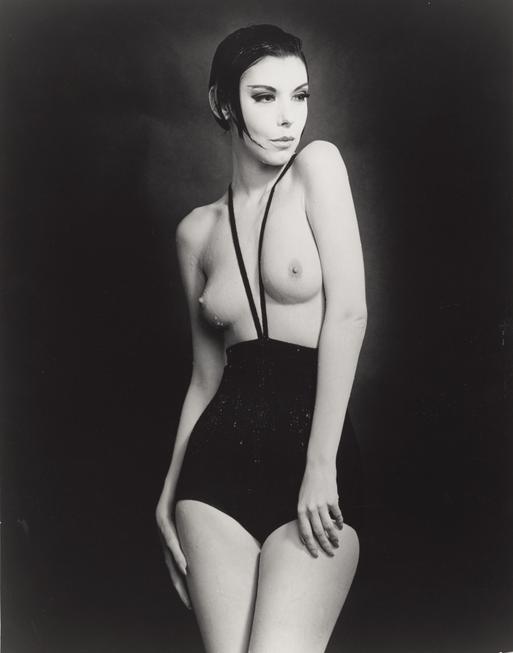
Peggy Moffitt in Rudi Gernreich Topless Swimsuit, 1964, William Claxton, gelatin silver print
© The William Claxton Estate
Transcript
[upbeat 1960s era music]
MALE NARRATOR: David Fahey is the owner of the Fahey/Klein Gallery, which specializes in fine art photography.
DAVID FAHEY: I see it as an iconic photograph from the 60s, and in terms of the history of fashion photography, if you’re a collector of that genre, you have to own this photograph. It’s super important.
MALE NARRATOR: Dripping with water, model Peggy Moffitt sports a topless bathing suit, a monokini, designed by Rudi Gernreich.
DAVID FAHEY: Rudy Gernreich was a designer who was all about breaking the rules and kind of going beyond the existing social mores of the time. He was Austrian, and for him, nudity was not an issue. He always felt the Americans were very timid and conservative about that. And so he designed the monokini, as it's called at the time. He didn't design it as something to sell. It was a political and social statement about the Sexual Revolution, and about women and how women’s roles in our society are changing, and they’re looked upon differently. He chose a very independent woman at the time, Peggy Moffitt.
MALE NARRATOR: Peggy Moffitt wasn’t just a pretty face and shapely body. She had very clear rules about modeling for this image. First, it would be taken by her husband, photographer William Claxton. Second, she would not be paid for it. Third, and most importantly, she had final say on where it could be published.
DAVID FAHEY: For example, she was asked by Playboy to put it in. She said, “Absolutely not. It’s not what this is meant to convey.” She was on top of the movement at the time, and she did not want it to be seen as something sexualized. It was more of a statement about liberation and freedom. What always stood out for me is, it’s this black field, with a black bathing suit, and then this white body emanating from the background. It almost is saying, “I’m a modern, contemporary woman, and I’m coming at you. I’m coming forward. We’re moving towards you.” It’s a photograph with an attitude.
[music ends]